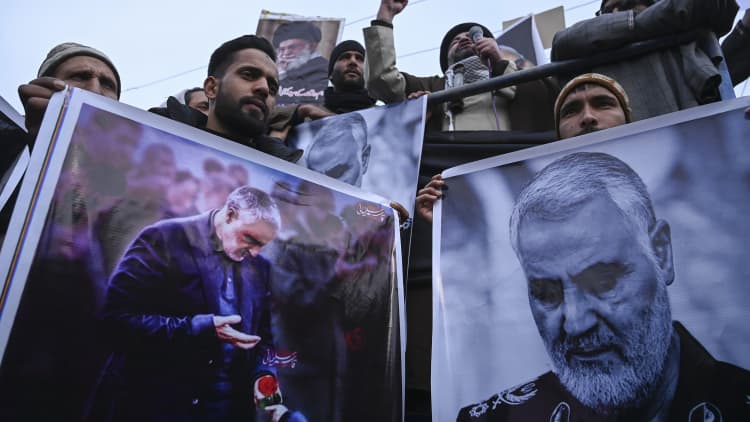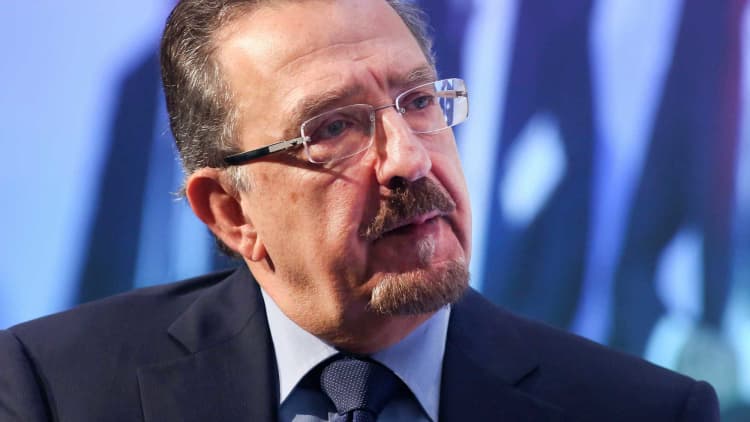
The U.S. airstrike that killed Iran's top military general has escalated tensions between the two nations and injected fresh uncertainty Friday around geopolitics and financial markets.
Analysts weighed in Friday on CNBC, offering their insights into how the death of Maj. Gen. Qasem Soleimani will impact the oil industry and the economy, as well as the potential for further conflict between the U.S. and Iran.
Sadad al-Husseini, former Saudi Aramco executive

While oil prices surged by up to 4% on Friday, Sadad al-Husseini, former executive vice president of exploration and production operations at Saudi Arabia's state-owned oil company, Saudi Aramco, said he would not describe the uptick as substantial or sustainable.
"I think the markets are pretty well saturated with supply, so we have to wait and see how the situation unfolds," he said. "But currently I wouldn't say that we've had a very strong move."
When asked about the threat of Iran retaliating against the U.S. or other actors in the Middle East, al-Husseini said he thought any response from Tehran would be narrowly focused.
"I believe the problem is really between the U.S. and Iran at this point. It's not about the oil fields or the other countries in the [Persian] Gulf," he said on "Squawk Alley." "I think Iran has been overplaying its hand ... I don't think they would want to do anything with the other countries in the region. That wouldn't advance or affect their issue with the U.S."
Brian Levitt, Invesco market strategist

Brian Levitt, global market strategist for North America at Invesco, said he does not believe the killing of Soleimani will mark a turning point in the longest economic expansion in U.S. history.
It is true that incident and potential responses from Iran can create volatility in the market, Levitt said. But it is important for investors to remember the larger economic narrative, he said.
That is, it remains a slow-growth world, monetary policy is still accommodative and equities are cheap relative to bonds, he said.
"I'd be very surprised if we look back a year from now or two years from now and say, 'This was the event that ended the elongated business and market cycle,'" Levitt said on "Squawk Box."
On Thursday morning, before the news that President Donald Trump ordered the airstrike that killed Soleimani, Wall Street pioneer Burton Malkiel told CNBC that he believed an "international shock" would be what caused the next recession.
Paul Sankey and Scott Nations

Mizuho managing director Paul Sankey said "significant unrest" in the Middle East involving Iran and the U.S. is both a real threat and "a major issue" for oil markets.
If the oil production of both Iran and Iraq, the country in which Soleimani was killed, was bundled together, it would represent the fourth-largest producer in the world, behind the U.S., Saudi Arabia and Russia, Sankey pointed out.
That means a notable share of the world's oil is under direct geopolitical pressure, Sankey said on "Squawk Alley."
"It's just a reminder that we want to own U.S. oil and that's it basically," he said.
Scott Nations, president and chief investment officer of NationsShares, struck a different chord than Sankey.
Also appearing on "Squawk Alley," Nations said he did not believe the escalating tensions with Iran should cause major damage to the oil market. He cited Russia's desire to increase crude production, as well as Saudi Arabia's ability to increase output.
"When it comes to a purely economic point of view, I don't think our interests have been substantially harmed. Geopolitically, we're going to have to see," he said.
"But as far as crude oil prices and supply and what it's going to mean for consumers of crude oil, I don't think it's going to be a big geoeconomic issue for the United States."
Bob McNally and Kevin Book

Despite crude prices on Friday reaching their highest levels since April, Bob McNally, president of Rapidan Energy Group, said the market still has a "pretty complacent" attitude toward the oil sector.
"I think the market is taking the view that Iran is sane enough not to uncork a Gulf War by retaliating directly against U.S. soldiers, bases and vessels," the one-time energy advisor to President George W. Bush said on "Power Lunch."
"I think the market is taking it in stride pretty well so far," McNally added.
To the contrary, Kevin Book, managing director at ClearView Energy Partners, said he thought the market was not fully pricing in "what could go wrong adequately."
While oil supply is outpacing demand and spare production capacity exists across major oil producers, Book said the range of possibilities for Iran's escalations are severe.
"Those kinds of escalations get into targets that could be producing targets in the region," he said, such as the Strait of Hormuz and other oil transit routes.
"It doesn't look like Iran's ready yet to target U.S. troops," he said on "Power Lunch." "But cyberattacks can be incredibly disabling and also disabling to operations and business systems of producers. All those things could move barrels off the market."


